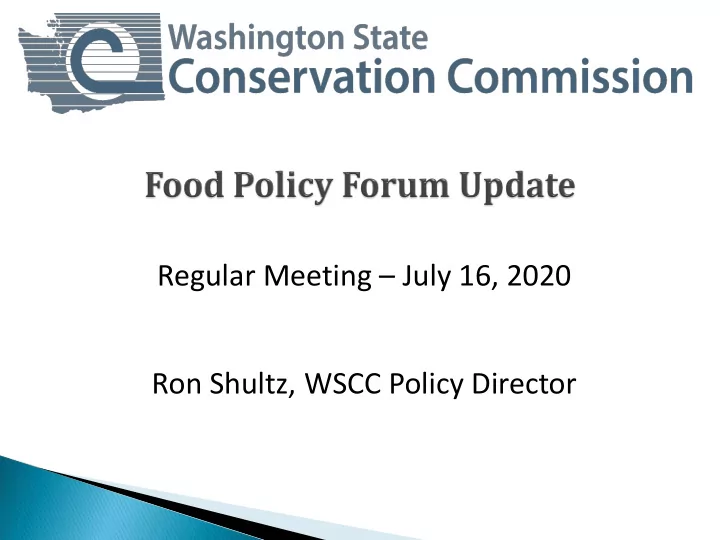

Regular Meeting – July 16, 2020 Ron Shultz, WSCC Policy Director
Originally started through budget proviso in 2016. Continued by proviso through current biennium. Last session – legislation established the Forum in SCC statute. Co-coordinated by SCC and WSDA, with OFP. Composed of representatives of food/hunger advocacy organizations, farmers markets, food distribution, commodity groups, ag groups, CDs. Developed recommendations in 2017. Working on implementation recommendations. Recommendations focus on elements of the food system.
Addresses the food system:
Elements of the food system applicable to our work: ◦ Food Production ◦ Food Processing (value added) ◦ Food Distribution (food hubs) ◦ Markets and Purchasing (web based farm links) Also a farmland preservation issue. Keeping farmers economically viable.
In March, after Covid-19 pandemic, Governor’s Office asked the Food Policy Forum to evaluate their recommendations in light of the impact the Covid related shutdowns were having on the food system. Forum met through April and May to develop recommendations for actions. Draft report completed and will be finalized at Forum meeting this Thursday.
Actions categorized in 4 challenges: 1. Threat to near and long-term economic viability of ag and food enterprises. 2. Public health elements of the food system need support to maintain capacity. 3. Increased need for nutrition services and assistance due to unemployment and economic insecurity. 4. Need to foster resilience in the face of a changing climate to ensure long-term food security.
Recommendations within each of the opportunities was categorized according to timing of implementation: ◦ Immediate Term: July to September 2020 ◦ Near Term: October to December 2020 ◦ Mid-Tem: January to March 2021
Recommendations relating to conservation district work: Explicitly include small, direct, and regional marketing farms in small business, workforce, and emergency payments or loan programs. Increase business technical support to offer 1-1 counseling to small and mid-scale farm and food enterprises to among other things make sure businesses are ready to receive funding, develop business plans etc., and take advantage of opportunities like new markets. Develop ombudsman/woman position at the state to coordinate and share information regarding relief resources and services to help farmers understand and access the resources available to them. Support technical assistance providers (e.g., local CDs, WSU, SCC, WSDA, etc.) using state or federal dollars to work with producers to tackle a variety of issues related to pivoting from one market to another.
Recommendations relating to conservation district work: Explore partnering with Workforce Development Councils to seek funding for labor and staff for key agricultural supply chain positions to help build out the needed regional-scale production, processing and distribution systems needed to make our food system more resilient to the pressures of a crisis such as COVID-19. Develop business-to-business needs and assets linkage opportunities to support matchmaking between producers and markets and product and available infrastructure. Support market cultivation by increasing resources to enable coordination to match growers with markets and products with appropriate available infrastructure. Offer an e-commerce platform and support agricultural enterprises to participate so that enterprises that need to can rapidly develop the ability to take orders or sell product online.
Recommendations relating to conservation district work: ‣ Share successful changes agriculture and food enterprises have made to new markets during COVID and share insights so that other businesses can learn from their experience. Technical assistance providers, researchers, and community-based organizations can contribute to this with funded capacity. ‣ Identify storage, warehousing, and processing facilities where large amounts of a commodity can be broken-down to sizes and quantities that can be distributed to homes, food banks, food pantries, and other distribution centers. ‣ Support and expand existing statewide directory of farms selling for local purchasing to help consumers find farm product. ‣ Develop and implement consumer education, marketing, and promotion campaign to help consumers engage with new e-commerce tools.
Recommendations relating to conservation district work: ‣ Provide $100 million in funding to existing WSCC programs for the purchase of conservation easements or development rights to secure multi-benefit agricultural lands owned by producers most impacted by COVID-19. ‣ Allocate pass-through funding to the WSCC to expand existing land linking programs that connect open agricultural ground with producers looking for additional acreage. ‣ Implement a cooperative program between WSCC and the Washington State Housing and Finance Commission to provide low interest loan capital for practitioners to buy agricultural ground at high risk of conversion.
Recommendations relating to conservation district work: ‣ Support conservation programs and resources that provide direct financial assistance to farmers to implement best management practices that address impacts of climate change and also provide employment opportunities, and economic development. ‣ Washington agencies and organizations should continue preparations for near-term and long-term planning and implementation of programs related to the climate change recommendations outlined by this the Impacts of Climate Change Team in the June 2019 report to the Legislature.
On June 16, during a briefing on the draft recommendations with the Governor’s Office, OFM, and directors of SCC and WSDA, OFM requested a decision package related to the Food Policy Forum. To help us identify activities of CDs for possible funding request, Laura put together a survey for CDs. The survey will help us gather information on what CDs are currently doing relating to the food system, actions they may have initiated due to Covid- 19, and actions they would be interested in taking if resources were made available.
Next Steps: • Distribution of the final Food Policy Forum Report. • Engagement with CDs on food system activities. • Development of funding requests for food system work. • Continue implementation of Food Policy Forum Report recommendation.
Discussion / Questions
Recommend
More recommend